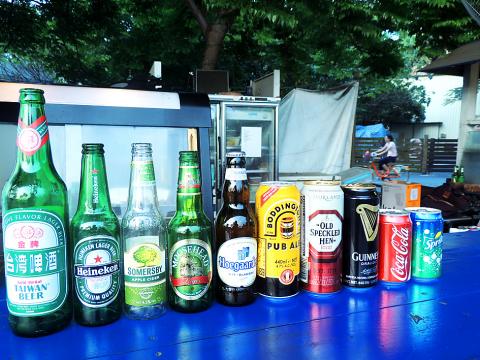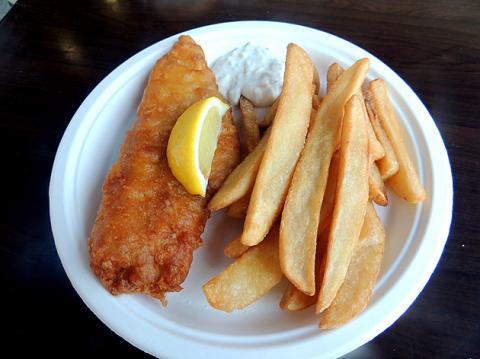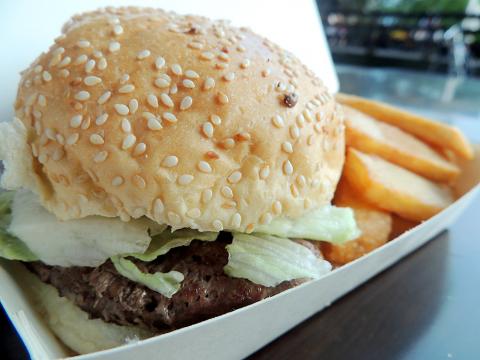You can tell summer is around the corner when you go down to Gongguan Riverside Park (公館水岸) and it is inhabited by joggers and cyclists, and there are families heading into the Museum of Drinking Water (臺北水道水源地) to learn more about water filtration.
An unlikely new arrival to this year’s riverside scene is Dazzler’s Fish and Chips, which serves fish and chips (NT$200) and not much else at its blue-and-white storefront with outdoor seating.
The joint looks simplistically casual and maybe a little dinky, but if you have a taste for the marquee item, it is a good place and even the best place for enjoying a sunny Saturday afternoon.

Photo: Enru Lin, Taipei Times
Opened last June by a long-term expatriate from Birmingham, UK, Dazzler’s does the classic British fish and chips: one big portion of firm white dory fillet tossed in beer batter, deep-fried and served with steak fries, a scoop of tartar sauce and a wedge of lemon.
I could see the grease pool on my order with a special acuity, partly because it sat on a white paper plate but also because everybody in the vicinity was exercising. But this thing was surprisingly enjoyable, full of flavor and very filling. Both the fish and the chips are fried up on the spot. The fries are good and sturdy, left unseasoned, so you will need to drown them in malt vinegar and Tabasco yourself. The mahogany batter on the fish, also left unseasoned, is almost a cakey affair with an unusual chewy texture. Break it open, and the insides are hot and sweet, with a delicate buttery taste.
The tartar sauce is homemade, with a thicker consistency and a creamier mayonnaise base than Hellmann’s. It is packed with tiny pickle pieces that give texture and impart a mild tang, and there is a hint of onion that makes it savory, too. Overall, this sauce is very nice — it makes the fish rich, but is light enough to eat on its own.

Photo: Enru Lin, Taipei Times
You can also order a hill of chips (NT$100) a la carte and pair it with gravy or curry sauce (NT$40), also made in-house.
Dazzler’s also offers a couple other entrees: English sausage dogs (NT$150) and burgers, including a fish burger (NT$150), which is a fried white dory fillet in a bun and comes with chips.
The beef burger (NT$150), served with cheese for another NT$20, is a basic little specimen that should satisfy a purist. The Australian beef patty — a bit thin but grilled to order and gleefully fatty — is served animal-style, with a nominal serving of cold lettuce, pillowy sesame buns and a mess of ketchup and mustard.

Photo: Enru Lin, Taipei Times
Wash it down with a beer or English tea (served hot at NT$80 a cup and NT$120 a pot). The alcohol list at Dazzler’s includes hard apple cider (NT$150), Guinness (NT$180) a few less-common craft drinks like Moosehead (NT$130) and Hoegaarden (NT$150), a Belgian wheat beer.
Warning: Excessive consumption of alcohol can damage your health.

April 28 to May 4 During the Japanese colonial era, a city’s “first” high school typically served Japanese students, while Taiwanese attended the “second” high school. Only in Taichung was this reversed. That’s because when Taichung First High School opened its doors on May 1, 1915 to serve Taiwanese students who were previously barred from secondary education, it was the only high school in town. Former principal Hideo Azukisawa threatened to quit when the government in 1922 attempted to transfer the “first” designation to a new local high school for Japanese students, leading to this unusual situation. Prior to the Taichung First

Chinese Nationalist Party (KMT) Chairman Eric Chu (朱立倫) hatched a bold plan to charge forward and seize the initiative when he held a protest in front of the Taipei City Prosecutors’ Office. Though risky, because illegal, its success would help tackle at least six problems facing both himself and the KMT. What he did not see coming was Taipei Mayor Chiang Wan-an (將萬安) tripping him up out of the gate. In spite of Chu being the most consequential and successful KMT chairman since the early 2010s — arguably saving the party from financial ruin and restoring its electoral viability —

The Ministry of Education last month proposed a nationwide ban on mobile devices in schools, aiming to curb concerns over student phone addiction. Under the revised regulation, which will take effect in August, teachers and schools will be required to collect mobile devices — including phones, laptops and wearables devices — for safekeeping during school hours, unless they are being used for educational purposes. For Chang Fong-ching (張鳳琴), the ban will have a positive impact. “It’s a good move,” says the professor in the department of

Article 2 of the Additional Articles of the Constitution of the Republic of China (中華民國憲法增修條文) stipulates that upon a vote of no confidence in the premier, the president can dissolve the legislature within 10 days. If the legislature is dissolved, a new legislative election must be held within 60 days, and the legislators’ terms will then be reckoned from that election. Two weeks ago Taipei Mayor Chiang Wan-an (蔣萬安) of the Chinese Nationalist Party (KMT) proposed that the legislature hold a vote of no confidence in the premier and dare the president to dissolve the legislature. The legislature is currently controlled